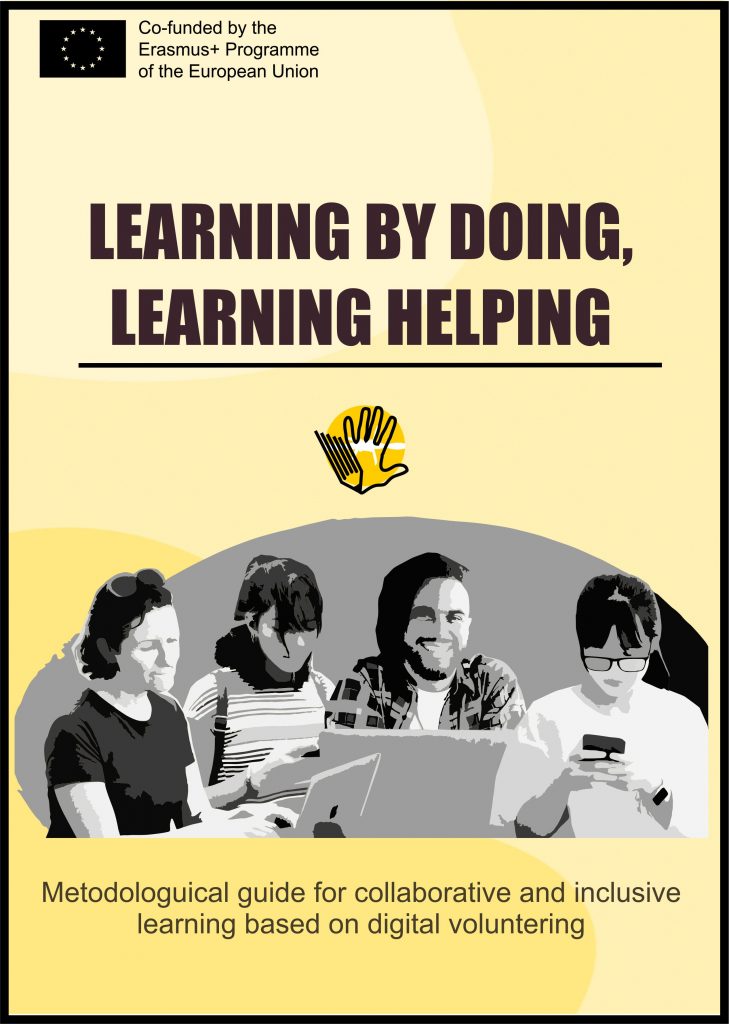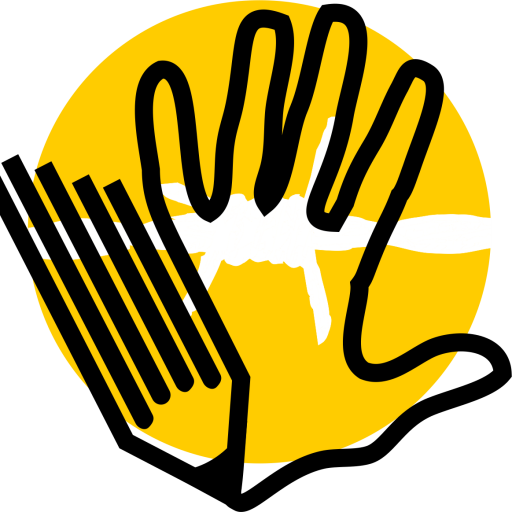METHODOLOGICAL GUIDE
.
The Methodological Guide “LEARNING BY DOING, LEARNING HELPING” provides all the necessary indications so that the teacher or trainer of adults, whether they are born in Europe or migrants or refugees, can implement the innovative methodology of digital volunteering for the learning and inclusion of adults with obstacles developed: the LEARNING HELPING methodology. This methodology allows the development of the basic competencies of native adult learners, and promotes the inclusion of migrants and/or refugees. All this through a structured learning itinerary through social volunteering activities.
This innovative methodology allows involved adult learners to develop their skills through practice, with real cases that can help people who need it most. In this way, students will learn by doing through unique and unforgettable experiences.
To this end, the guide is structured in 11 sections and 8 annexes that provide the adult teacher with all the knowledge, tools, and resources necessary to successfully implement this methodology.

In the development of this project, we intended the learning process not to remain limited to traditional models. We maintain that experience and collective participation are the best ways to get the best results in learning processes, so based on the constructivist principle of “action-oriented teaching”, and combining two pedagogical strategies of great international renown (learning by doing and peer tutoring), to which we add a technological and innovative perspective through digital media, we intend to place work in social volunteering as the framework of real learning experiences. This result is based on the precept that the only way to learn is by doing useful things.
The Learning Helping methodology generates structured learning itineraries that comprise a set of training actions or digital volunteering activities and training activities in the form of generic problems that students must successfully complete and successively a series of activities based on digital volunteering.

Defined through an initial test of interests and knowledge, and structured based on 2 levels of difficulty (basic and advanced) and 6 modules or areas of knowledge, 5 learning itineraries have been determined that seek at the same time to develop specific capacities of the official curriculum of Cycle I of adult basic education and meet specific needs of social entities through digital volunteering actions.
These training itineraries are carried out autonomously forming pairs of two students with complementary needs and knowledge and give rise to a peer learning process reinforced by the tutoring of a teacher. In addition, it provides contact with dozens of social entities interested in participating in this process, so that the generic activities provided can be transformed into real volunteer actions.
The methodological guide “LEARNING BY DOING, LEARNING HELPING” provides various tools and resources to implement this methodology in adult training centers throughout Europe. Its most important tool is the “Virtual Volunteering Lab (VVL)” (R1). This virtual learning tool, created following the specific methodology defined in this guide, implements the entire educational process by itself.
The learning process through the Virtual Volunteering Lab begins with the registration of the students to access the internal area of the digital platform and their personal space. The user then faces an initial test to determine their previous knowledge, and depending on its result, the VVL automatically defines the most appropriate educational itinerary for their learning needs and assigns a study pair with a different but complementary profile.
Once this process is completed, students are able to access the internal area of the platform and the development of training activities. In this way, learning is structured around the digital volunteering activities that they carry out. Once the training itinerary has been completed, the user can take an individual final test to evaluate the acquisition of competences corresponding to Level 1 of the European Qualifications Framework for lifelong learning (EQF). If the test is successfully passed, the user receives a certificate and a digital badge (R2) accrediting the skills acquired.

.
TRAINING ITINERARY
DEFINITION AND DESIGN
They are the set of training actions defined through a preliminary test of interests and knowledge which, while developing specific capabilities that match the official curriculum of Cycle I of basic adult education, meet specific needs of the social entities through digital volunteering actions.
- Development of the competences to be worked on each itinerary (matching the official curriculum of adult education).
- Capable of turning into real volunteering actions covering the needs of the partner and/or collaborating entities.
Each of these training actions included in the itineraries, is presented as a generic problem, considering the two previous characteristics, and provides suggestions of social entities to which to resort and turn a generic activity into a training activity to collaborate with the needs of the entities and their beneficiaries.
TRAINING ITINERARIES

ITINERARY 1: LITERACY AND INITIATION OF BASIC FORMATION.
(LEVEL 1: Basic training. Comprised of a series of basic training activities.)
| Module 1 | Basic language communication and inclusion skills. |
| Module 2 | Basic skills in mathematics, science, technology, and digital environment. |
| Module 3 | Basic social and civic skills, initiative and entrepreneurship, awareness, and cultural expressions. |
ITINERARY 2: COMMUNICATION, LANGUAGE AND INCLUSION.
(LEVEL 2: Intermediate training. Comprised of a series of basic training activities and other complementary reinforcement training.)
| Module 2 | Basic skills in mathematics, science, technology and digital environment. |
| Module 3 | Basic social and civic skills, initiative and entrepreneurship, awareness and cultural expressions. |
| Module 4 | Complementary language communication and inclusion competences. |
ITINERARY 3: MATHEMATICAL TOOLS IN DIGITAL VOLUNTEERING.
(LEVEL 2: Intermediate training. Comprised of a series of basic training activities and other complementary reinforcement training.)
| Module 1 | Basic language communication and inclusion skills. |
| Module 3 | Basic social and civic skills, initiative and entrepreneurship, awareness and cultural expressions. |
| Module 5 | Complementary competences in mathematics, science, technology and digital environment. |
ITINERARY 4: SOCIETY, TERRITORY, AND CULTURAL PROCESSES.
(LEVEL 2: Intermediate training. Comprised of a series of basic training activities and other complementary reinforcement training.)
| Module 1 | Basic language communication and inclusion skills. |
| Module 2 | Basic skills in mathematics, science, technology and digital environment. |
| Module 6 | Complementary social and civic competences, initiative and entrepreneurship, awareness and cultural expressions. |
ITINERARY 5: COMPLEMENTARY TRAINING.
(LEVEL 3: Specific training. Composed of a series of complementary reinforcement training activities.)
| Module 4 | Complementary language communication and inclusion competences. |
| Module 5 | Complementary competences in mathematics, science, technology and digital environment. |
| Module 6 | Complementary social and civic competences, initiative and entrepreneurship, awareness and cultural expressions. |
DIGITAL VOLUNTEERING ACTIVITIES
Digital volunteering activities are the main training tool in the learning helping methodology. The collaboration between adults-students-volunteers is developed with the social entities that request specific activities. These are included in the modules according to the relationship they have with the curricular contents. To do this, we can either develop an extensive repertoire of possible generic activities and then link them to the modules they match the most, or devise the possible types of volunteering activities better related to each module.
.
| DIGITAL VOLUNTEERING ACTIVITIES | DESCRIPTION |
| Research and information-seeking activities. | Study of the needs and concerns of the public to be addressed. |
| Translation activities. | Translation of texts and videos. |
| Management. | Agencies for entities. Official records. Digital certificates. |
| Data analysis. | |
| Arts and Material Design. | Design of logos, posters, and banners. Create graphic contents for social networks. |
| Audiovisuals. | Create introductions for videos. Video editing. Audiovisual production. |
| Online training. | Create CVs. Environmental education. Recycling craft workshops. |
| Database development. | |
| Computer development. | Website management. |
| Project management and development. | Create work lines. Create lines of action. Mission development and project vision. |
| Editing/writing. | Editing and writing posts, blogs, and press releases. Create social media posts. Collaboration in investigative or informative journalistic articles. Document writing: proposals, reports, etc. |
| Training and preparation. | Training in social media management. Training in group management. Training in emotional management. Health training (first aid). Training in financial management. Cultural mediation training: basic geographical, historical, and cultural information of the host country. |
| Management of social network profiles. | Study of the strategies for attracting and maintaining followers. |
| Management of volunteers. | Recruitment of volunteers for events. |
| Leadership and strategy. | Annual strategic planning of activities. |
| Podcasting. | Radio activities. Create podcasts on different topics. |
| Mapping. | Looking for resources, NGOs and their activities, etc. to meet the needs of aid seekers. |
| Moderate online group discussions. | |
| Organization of events. | Search for discount platforms for entities. Create or search of didactic or dynamic group activities for the work in educational subject. |
| Participating in project activities. | |
| Budgets. | |
| Awareness-raising and promotion. | Search for up-to-date information on current social problems. |
| Other services. |
YOUR OPINION IS IMPORTANT TO US



